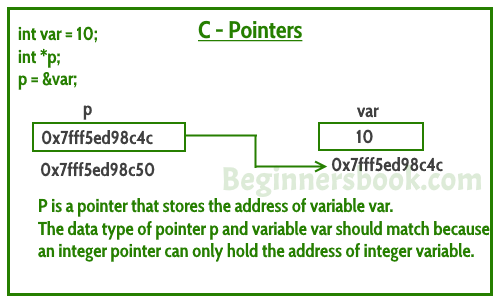POINTERS PART 2
C Pointers – Operators that are used with Pointers
Lets discuss the operators & and * that are used with Pointers in C.
“Address of”(&) Operator
We have already seen in the first example that we can display the address of a variable using ampersand sign. I have used &num to access the address of variable num. The & operator is also known as “Address of” Operator.
printf("Address of var is: %p", &num);
Point to note: %p is a format specifier which is used for displaying the address in hex format.
Now that you know how to get the address of a variable but how to store that address in some other variable?
That’s where pointers comes into picture. As mentioned in the beginning
of this guide, pointers in C programming are used for holding the
address of another variables.
Pointer is just like another variable, the main difference is that it stores address of another variable rather than a value.
“Value at Address”(*) Operator
The * Operator is also known as Value at address operator.
How to declare a pointer?
int *p1 /*Pointer to an integer variable*/ double *p2 /*Pointer to a variable of data type double*/ char *p3 /*Pointer to a character variable*/ float *p4 /*pointer to a float variable*/
The above are the few examples of pointer declarations. If you need a pointer to store the address of integer variable then the data type of the pointer should be int. Same case is with the other data types.
By using * operator we can access the value of a variable through a pointer.
For example:
double a = 10; double *p; p = &a;
*p would give us the value of the variable a. The following statement would display 10 as output.
printf("%d", *p);
Similarly if we assign a value to *pointer like this:
*p = 200;
It would change the value of variable a. The statement above will change the value of a from 10 to 200.
Example of Pointer demonstrating the use of & and *
#include <stdio.h> int main() { /* Pointer of integer type, this can hold the * address of a integer type variable. */ int *p; int var = 10; /* Assigning the address of variable var to the pointer * p. The p can hold the address of var because var is * an integer type variable. */ p= &var; printf("Value of variable var is: %d", var); printf("\nValue of variable var is: %d", *p); printf("\nAddress of variable var is: %p", &var); printf("\nAddress of variable var is: %p", p); printf("\nAddress of pointer p is: %p", &p); return 0; }
Output:
Value of variable var is: 10 Value of variable var is: 10 Address of variable var is: 0x7fff5ed98c4c Address of variable var is: 0x7fff5ed98c4c Address of pointer p is: 0x7fff5ed98c50

Lets take few more examples to understand it better –
Lets say we have a char variable ch and a pointer ptr that holds the address of ch.
char ch='a'; char *ptr;
Read the value of ch
printf("Value of ch: %c", ch); or printf("Value of ch: %c", *ptr);
Change the value of ch
ch = 'b'; or *ptr = 'b';
The above code would replace the value ‘a’ with ‘b’.
Can you guess the output of following C program?
#include <stdio.h> int main() { int var =10; int *p; p= &var; printf ( "Address of var is: %p", &var); printf ( "\nAddress of var is: %p", p); printf ( "\nValue of var is: %d", var); printf ( "\nValue of var is: %d", *p); printf ( "\nValue of var is: %d", *( &var)); /* Note I have used %p for p's value as it represents an address*/ printf( "\nValue of pointer p is: %p", p); printf ( "\nAddress of pointer p is: %p", &p); return 0; }
Output:
Address of var is: 0x7fff5d027c58 Address of var is: 0x7fff5d027c58 Value of var is: 10 Value of var is: 10 Value of var is: 10 Value of pointer p is: 0x7fff5d027c58 Address of pointer p is: 0x7fff5d027c50
More Topics on Pointers
1) Pointer to Pointer – A pointer can point to another pointer (which means it can store the address of another pointer), such pointers are known as double pointer OR pointer to pointer.
2) Passing pointers to function – Pointers can also be passed as an argument to a function, using this feature a function can be called by reference as well as an array can be passed to a function while calling.
3) Function pointers – A function pointer is just like another pointer, it is used for storing the address of a function. Function pointer can also be used for calling a function in C program.
Comments
Post a Comment